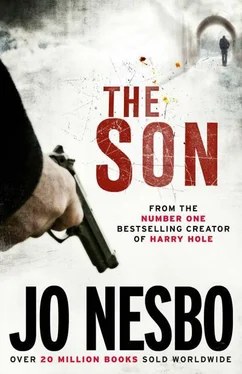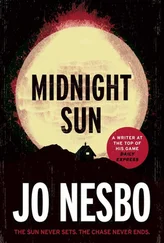Jo Nesbo - The Son
Здесь есть возможность читать онлайн «Jo Nesbo - The Son» весь текст электронной книги совершенно бесплатно (целиком полную версию без сокращений). В некоторых случаях можно слушать аудио, скачать через торрент в формате fb2 и присутствует краткое содержание. Год выпуска: 2014, Издательство: Random House, Жанр: Триллер, на английском языке. Описание произведения, (предисловие) а так же отзывы посетителей доступны на портале библиотеки ЛибКат.
- Название:The Son
- Автор:
- Издательство:Random House
- Жанр:
- Год:2014
- ISBN:нет данных
- Рейтинг книги:3 / 5. Голосов: 1
-
Избранное:Добавить в избранное
- Отзывы:
-
Ваша оценка:
- 60
- 1
- 2
- 3
- 4
- 5
The Son: краткое содержание, описание и аннотация
Предлагаем к чтению аннотацию, описание, краткое содержание или предисловие (зависит от того, что написал сам автор книги «The Son»). Если вы не нашли необходимую информацию о книге — напишите в комментариях, мы постараемся отыскать её.
The Son — читать онлайн бесплатно полную книгу (весь текст) целиком
Ниже представлен текст книги, разбитый по страницам. Система сохранения места последней прочитанной страницы, позволяет с удобством читать онлайн бесплатно книгу «The Son», без необходимости каждый раз заново искать на чём Вы остановились. Поставьте закладку, и сможете в любой момент перейти на страницу, на которой закончили чтение.
Интервал:
Закладка:
‘Do you need a room?’
The boy nodded and she turned the key in the switch which opened the door lock downstairs. She called out to Stine, who was in the kitchen making sandwiches for one of the residents, to watch reception in her absence. Then she jogged down the stairs and past the iron gate used to bar access to the reception in case intruders forced their way through the entrance door. The boy was standing inside the door, looking around.
His coat was buttoned all the way up to his neck and reached down almost to his ankles. He was barefoot and she could see blood in one wet footprint by the entrance door. But Martha had seen most things by now so what caught her attention was first and foremost his eyes. The way he looked at her. She couldn’t explain it any other way. His eyes were focused on her and in them she could see that he was processing the visual impression which she made. It might not be much, but it was more than she was used to at the Ila Centre. And, for a brief moment, it crossed her mind that he might not be using after all, but she dismissed the thought just as quickly.
‘Hello. Come with me.’
He followed her up to the first floor and into the meeting room via reception. As usual she left the door open so Stine and the others could see them, asked him to take a seat and took out the forms for the obligatory introduction interview.
‘Name?’ she asked.
He hesitated.
‘I need to put a name on this form,’ she said, giving him the opening which many of the people who came here needed.
‘Stig,’ he said tentatively.
‘Stig is fine,’ she said. ‘Anything else?’
‘Berger?’
‘Then that’s what we’ll write here. Date of birth?’
He stated a date and a year and she calculated that he had turned thirty. He looked much younger. That was the strange thing with addicts, it was easy to misjudge their age in either direction.
‘Did anyone refer you here?’
He shook his head.
‘Where did you sleep last night?’
‘Under a bridge.’
‘So I presume you’re of no fixed abode and don’t know which Social Services office you come under; therefore I’ll pick the number eleven which is your birthday and that gives us. .’ She checked her list. ‘Alna Social Services, which, in its infinite mercy, will hopefully decide to fund you. What kind of drugs are you on?’
Her pen was hovering, but he made no reply.
‘Just mention your favourite poison.’
‘I’ve quit.’
She put down her pen. ‘The Ila Centre is a place for active drug users. I can make a call to the centre in Sporveisgata and see if they have a room for you. It’s much nicer than here.’
‘Are you saying. .?’
‘Yes, I’m saying you need to get high on a regular basis to qualify.’ She flashed him a tired smile.
‘And if I were to say that I lied because I thought it would be easier to get a room here if I said I was clean?’
‘Then you have also answered that question correctly, but you’ve no more lifelines left, my friend.’
‘Heroin,’ he said.
‘And?’
‘Just heroin.’
She ticked the box on the form, but doubted if it was true. There was hardly a single pure heroin user left in Oslo; everyone was a mixed-substance user these days for the simple reason that if you combined the already mixed heroin with a benzodiazepine such as Rohypnol, for example, you got a bigger bang for your buck in terms of both the intensity and length of the fix.
‘Why have you come here?’
He shrugged. ‘To get a roof over my head.’
‘Any illnesses or essential medication?’
‘No.’
‘Do you have any plans for the future?’
He looked at her. Martha’s father used to say that a person’s past was written in their eyes and it was worth learning how to read it. But that their future couldn’t be found there. The future was unknown. Even so, Martha would later look back at this moment and ask herself if she could, if she should have been able to read anything about the future plans of the man who called himself Stig Berger.
He shook his head and gave the same reaction to her questions about work, education, previous overdoses, somatic illnesses, blood infections and mental health issues. At the end she explained that the centre had a policy of total confidentiality and they wouldn’t tell anyone that he was a resident, but should he wish to, he could complete a consent form naming anyone who could be given information, should they contact the centre.
‘So that your parents, friends or girlfriend can get in touch with you, for example.’
He smiled wistfully. ‘I’ve none of those.’
Martha Lian had heard this reply many times before. So many times it no longer made an impression on her. Her therapist called it compassion fatigue and had explained that it affected most people in her profession at some point. What worried Martha was that it didn’t seem to get any better. Of course she understood that there is a limit to how cynical a person who worries about their own cynicism can be, but she had always been fuelled by empathy. Compassion. Love. And she was close to running on empty. So she was startled when she heard the words I’ve none of those touch something, like a needle causing an atrophied muscle to twitch.
She gathered up the papers and put them in a folder which she left at reception and took the new resident down to a small storeroom on the ground floor.
‘I hope you’re not the paranoid type who can’t handle wearing second-hand clothing,’ she said and turned her back while he took off his coat and put on the clothes and trainers she had selected for him.
She waited till he coughed. She turned round. Somehow he looked taller and straighter in the pale blue jumper and the jeans. Nor was he as skinny as he had looked in the coat. He glanced down at his plain blue trainers.
‘Yes,’ she said. ‘The shoe of choice for the homeless.’
Large quantities of blue trainers had been donated to various deserving organisations in the 1980s by the Norwegian Army’s surplus depot and they had become synonymous with drug addicts and the homeless.
‘Thank you,’ he said quietly.
Martha had initially started seeing her therapist because of a resident who failed to thank her. It had only been one more ‘non-thank-you’ in a long line of other ‘non-thank-yous’ from the self-destructive individuals who still enjoyed some sort of existence thanks to the welfare state and the various social organisations the same junkies spent the majority of their waking hours ranting at. She had lost her temper. Told him to go to hell if he didn’t like the size of the disposable syringe he got for free so he could go to his room — for which Social Services paid six thousand kroner a month — to get high on drugs he had financed by stealing bicycles in the neighbourhood. Along with his complaint, the resident had filed a four-page-long hard-luck story. She had been forced to apologise.
‘Let me take you to your room,’ she said.
On the way up to the second floor she showed him where the bathrooms and lavatories were. Men walked past them with brisk footsteps and stoned eyes.
‘Welcome to Oslo’s best drugs shopping centre,’ Martha said.
‘In here?’ the boy asked. ‘You allow dealing?’
‘Not according to the rules, but if you’re using, you’ll obviously have drugs in your possession. And I’m telling you this because it’s useful for you to know, we don’t check if that’s one gram or one kilo. We’ve no control over what’s being bought and sold in the rooms. We’ll only enter if we suspect you of keeping weapons.’
‘People do that?’
She gave him a sideways glance. ‘Why do you ask?’
Читать дальшеИнтервал:
Закладка:
Похожие книги на «The Son»
Представляем Вашему вниманию похожие книги на «The Son» списком для выбора. Мы отобрали схожую по названию и смыслу литературу в надежде предоставить читателям больше вариантов отыскать новые, интересные, ещё непрочитанные произведения.
Обсуждение, отзывы о книге «The Son» и просто собственные мнения читателей. Оставьте ваши комментарии, напишите, что Вы думаете о произведении, его смысле или главных героях. Укажите что конкретно понравилось, а что нет, и почему Вы так считаете.











